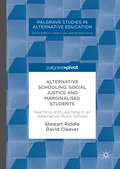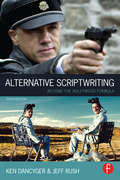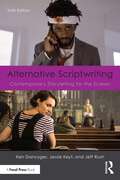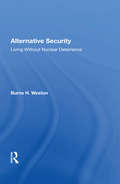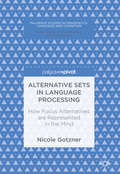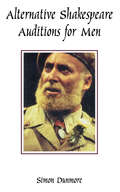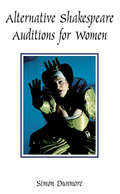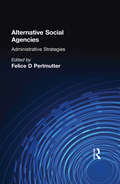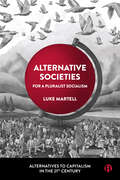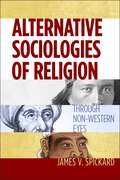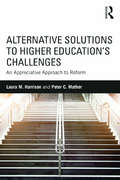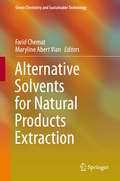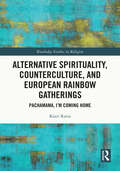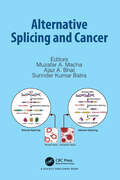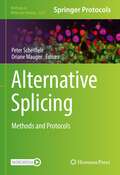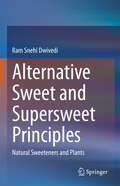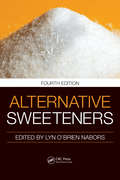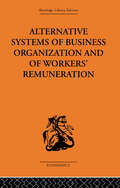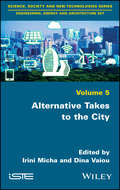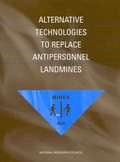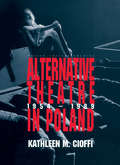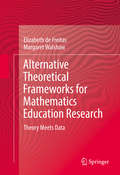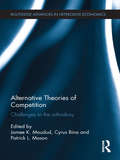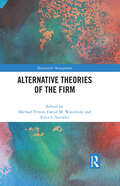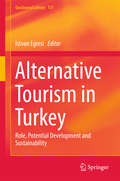- Table View
- List View
Alternative Schooling, Social Justice and Marginalised Students: Teaching and Learning in an Alternative Music School (Palgrave Studies in Alternative Education)
by Stewart Riddle David CleaverThis book examines the experiences and perspectives of students and teachers at an alternative music school, which caters for young learners who have been marginalised and disenfranchised from mainstream schooling. The school utilises a rich music-infused curriculum that connects to the lives of its students, alongside a democratic ethos and ethic of care for members of the school community, including the students, teachers, and parents. The combination of personal narratives together with detailed critical discussion, provides a compelling argument for how schools can make a major difference to the lives of young people. The case study presented in this book offers one potential response to the institutionalised social and educational inequities that young people continue to face, and highlights the important lessons from alternative schooling for education more broadly. It will be of particular interest to researchers in the areas of education and sociology, especially those concerned with matters of social justice and equity in education.
Alternative Scriptwriting: Beyond the Hollywood Formula (Scriptwriting Ser.)
by Ken Dancyger Jeff RushLearn the rules of scriptwriting, and then how to successfully break them.Unlike other screenwriting books, this unique guide pushes you to challenge yourself and break free of tired, formulaic writing--bending or breaking the rules of storytelling as we know them. Like the best-selling previous editions, seasoned authors Dancyger and Rush explore alternative approaches to the traditional three-act story structure, going beyond teaching you "how to tell a story" by teaching you how to write against conventional formulas to produce original, exciting material. The pages are filled with an international range of contemporary and classic cinema examples to inspire and instruct. New to this edition. New chapter on the newly popular genres of feature documentary, long-form television serials, non-linear stories, satire, fable, and docudrama. New chapter on multiple-threaded long form, serial television scripts. New chapter on genre and a new chapter on how genre’s very form is flexible to a narrative. New chapter on character development. New case studies, including an in-depth case study of the dark side of the fable, focusing on The Wizard of Oz and Pan’s Labyrinth.
Alternative Scriptwriting: Contemporary Storytelling for the Screen
by Ken Dancyger Jeff Rush Jessie KeytThe three-act structure is so last century! Unlike other screenwriting books, this unique storytelling guide pushes you to break free of tired, formulaic writing by bending or breaking the rules of storytelling as we know them. This new edition dives into all the key aspects of scriptwriting, including structure, genre, character, form, and tone. Authors Ken Dancyger, Jessie Keyt, and Jeff Rush explore myriad alternatives to the traditional three-act story structure, going beyond teaching you "how to tell a story" by teaching you how to write against conventional formulas to produce original, exciting material. Fully revised and updated, the book includes new examples from contemporary and classic cinema and episodic series, as well as additional content on strategies for plot, character, and genre; an exploration of theatrical devices in film; and approaches to scriptwriting with case studies of prolific storytellers such as Billy Wilder, Kelly Reichardt, Phoebe Waller-Bridge, and Kathryn Bigelow. Ideal for students of screenwriting and professional screenwriters wishing to develop their craft and write original scripts.
Alternative Security: Living Without Nuclear Deterrence
by Burns H WestonAlternative Security offers the thinking person a place to begin to kick the “nuclear habit.” Even as it accepts the premise that war is endemic to the human condition, it provides reassurance that an other-than-nuclear deterrence policy can work to effectively safeguard national and transnational interests. These eight original essays, acco
Alternative Sets in Language Processing: How Focus Alternatives are Represented in the Mind (Palgrave Studies in Pragmatics, Language and Cognition)
by Nicole GotznerThis book presents a novel experimental approach to investigating the mental representation of linguistic alternatives. Combining theoretical and psycholinguistic questions concerning the nature of alternative sets, it sheds new light on the theory of focus and the cognitive mechanisms underlying the processing of alternatives. In a series of language comprehension experiments, the author shows that intonational focus and focus particles such as 'only' shape the representation of alternatives in a listener's mind in a fundamental way. This book is relevant to researchers interested in semantics, pragmatics, language processing and memory.
Alternative Shakespeare Auditions for Men
by Simon DunmoreDunmore brings together fifty speeches for men from plays frequently ignored such as Titus Andronicus, Pericles, and Love's Labours Lost. It also includes good, but over-looked speeches from the more popular plays such as Octavius Caesar from Antony and Cleopatra, Leontes from The Winter's Tale and Buckingham from Richard III. With character descriptions, brief explanations of the context, and notes on obscure words, phrases and references, it is the perfect source for a unique audition.
Alternative Shakespeare Auditions for Women (Manuals Ser.)
by Simon DunmoreLike the companion volume for men, Alternative Shakespeare Auditions for Women brings together fifty speeches from plays frequently ignored such as Coriolanus, Pericles, and Love's Labours Lost. It also features good, but over-looked speeches from more popular plays such as Diana from All's Well That Ends Well, Perdita from The Winter's Tale and Hero from Much Ado About Nothing. Each speech is accompanied by a character description, brief explanation of the context, and notes on obscure words, phrases and references--all written from the viewpoint of the auditioning actor. It is the perfect resource for your best audition ever.
Alternative Social Agencies: Administrative Strategies
by Felice D PerlmutterUsing a diverse set of successful alternative programs as case examples, professionals who have been involved directly in the organization and development of alternative social programs explain the complicated process of planning and implementing new agencies. Alternative social agencies have emerged over the past two decades in response to a variety of needs not being met by older established agencies, but their survival is often limited. This comprehensive volume will help all of those involved in social administration to question their own administrative practices and struggle with new approaches that can best meet the needs of their present and/or potential constituencies. Existing social agencies will find these innovative ideas to be adaptable in meeting changing social conditions, service needs, and target populations. Topics include various direct services in voluntary health-related organizations and agencies; public sector agencies that are not usually associated with alternative programs; and descriptions of effective indirect service.
Alternative Societies: For a Pluralist Socialism
by Luke MartellIn a time of great gloom and doom internationally and of major global problems, this book offers an invaluable contribution to our understanding of alternative societies that could be better for humans and the environment. Bringing together a wide range of approaches and new strands of economic and social thinking from across the US, Mexico, Latin America, Europe, Asia, Middle East and Africa, Luke Martell critically assesses contemporary alternatives and shows the ways forward with a convincing argument of pluralist socialism. Presenting a much-needed introduction to the debate on alternatives to capitalism, this ambitious book is not about how things are but how they can be!
Alternative Sociologies of Religion: Through Non-Western Eyes
by James V SpickardUncovers what the sociology of religion would look like had it emerged in a Confucian, Muslim, or Native American culture rather than in a Christian oneSociology has long used Western Christianity as a model for all religious life. As a result, the field has tended to highlight aspects of religion that Christians find important, such as religious beliefs and formal organizations, while paying less attention to other elements. Rather than simply criticizing such limitations, James V. Spickard imagines what the sociology of religion would look like had it arisen in three non-Western societies. What aspects of religion would scholars see more clearly if they had been raised in Confucian China? What could they learn about religion from Ibn Khaldun, the famed 14th century Arab scholar? What would they better understand, had they been born Navajo, whose traditional religion certainly does not revolve around beliefs and organizations? Through these thought experiments, Spickard shows how non-Western ideas understand some aspects of religions—even of Western religions—better than does standard sociology. The volume shows how non-Western frameworks can shed new light on several different dimensions of religious life, including the question of who maintains religious communities, the relationships between religion and ethnicity as sources of social ties, and the role of embodied experience in religious rituals. These approaches reveal central aspects of contemporary religions that the dominant way of doing sociology fails to notice. Each approach also provides investigators with new theoretical resources to guide them deeper into their subjects. The volume makes a compelling case for adopting a global perspective in the social sciences.
Alternative Solutions to Higher Education's Challenges: An Appreciative Approach to Reform
by Laura M. Harrison Peter C. MatherMoving beyond critique, Alternative Solutions to Higher Education’s Challenges uses an appreciative approach to highlight what is working in colleges and universities and offers an examination of how institutions can improve practice. Drawing on examples and cases from real higher education institutions, this book offers a solution-focused framework that challenges the negative assumptions that have plagued higher education. Chapters explore how current narratives have perpetuated and maintained systematic flaws in our education system and have hindered reform. This invaluable resource breaks from the substantial literature that only highlights the many problems facing higher education today, and instead provides alternative strategies and essential recommendations for moving higher education institutions forward.
Alternative Solvents for Natural Products Extraction (Green Chemistry and Sustainable Technology)
by Farid Chemat Maryline Abert VianThis book presents a complete picture of the current state-of-the-art in alternative and green solvents used for laboratory and industrial natural product extraction in terms of the latest innovations, original methods and safe products. It provides the necessary theoretical background and details on extraction, techniques, mechanisms, protocols, industrial applications, safety precautions and environmental impacts. This book is aimed at professionals from industry, academicians engaged in extraction engineering or natural product chemistry research, and graduate level students. The individual chapters complement one another, were written by respected international researchers and recognized professionals from the industry, and address the latest efforts in the field. It is also the first sourcebook to focus on the rapid developments in this field.
Alternative Spirituality, Counterculture, and European Rainbow Gatherings: Pachamama, I’m Coming Home (Routledge Studies in Religion)
by Katri RatiaThis book explores the phenomenon of Rainbow Gatherings in Europe. These countercultural events form radically alternative temporary societies in the peripheries of modern states and manage themselves without centralized power, market economy or institutionalized forms of religion. The volume offers a vivid description of life in the Gatherings, analyses the main ideological tenets and places the meetings in historical and cultural context. It considers how the Rainbow Gathering tradition is rooted in networks of alternative spirituality and environmental counterculture but also reflects broader shifts in religion and religiosity.
Alternative Splicing and Cancer
by Ajaz A. Bhat Muzafar A. Macha Surinder Kumar BatraThis book Alternative Splicing and Cancer explores the crucial role alternative splicing, a post-transcriptional process, plays in human health and diseases, particularly cancer. Diving deep into the complexities of gene expression and protein diversity, the book illuminates how abnormal splicing contributes to aggressive tumor formation, affecting cellular functions such as proliferation, survival, and immune evasion. With a focus on understanding molecular mechanisms, this book unravels potential diagnostic and prognostic targets, opening doors for enhanced anti-cancer treatment efficacy. An indispensable resource for anyone intrigued by the interplay between gene splicing and cancer biology, it paves the way towards innovative therapeutic strategies.
Alternative Splicing: Methods and Protocols (Methods in Molecular Biology #2537)
by Peter Scheiffele Oriane MaugerThis detailed volume collects commonly used and cutting-edge methods to analyze alternative splicing, a key step in gene regulation. After an introduction of the alternative splicing mechanism and its targeting for therapeutic strategies, the book continues with techniques for analyzing alternative splicing profiles in complex biological systems, visualizing and localizing alternative spliced transcripts with cellular and sub-cellular resolution, probing regulators of alternative splicing, as well as assessing the functional consequences of alternative splicing. Written for the highly successful Methods in Molecular Biology series, chapters include introduction to their respective topics, lists of the necessary materials and reagents, step-by-step, reproducible protocols, and tips on troubleshooting and avoiding known pitfalls. Authoritative and practical, Alternative Splicing: Methods and Protocols serves as an ideal guide for both RNA aficionados that want to implement novel approaches in their labs and novices undertaking alternative splicing projects.
Alternative Sweet and Supersweet Principles: Natural Sweeteners and Plants
by Ram Snehi DwivediThis book compiles the latest information on different kinds of natural, plant-based super sweeteners. A book on alternative, natural super sweeteners is extremely timely and useful, especially, in light of the decreasing cultivable area, ever increasing demand for sucrose, and the well identified ills of sugar consumption. Every year more than 5.0 million people die due to diabetes and diabetes-associated diseases like cardiovascular, kidney disorder, liver cancer etc. This book describes the use of non-saccharide super sweet principles to counter such maladies. The readers will get an in-depth understanding of different kinds of sweeteners, molecular basis of sweetness, their general classification, plant source with photo-plates etc. The chapters explain different kinds of super-sweet principles. This book emphasizes on the propagation, cultivation and conservation of NSSS plants (NSSSP) and extraction of super sweet principles and granting of generally recognised as safe (GRAS) certificate to sweeteners. The concluding chapter describes the eco-physiological difference between saccharide super sweet and non saccharide sweet plants. The book also describes commercial production of selected potential Natural Super Sweeteners. This book will be of great interest to researchers, extension workers as well as postgraduate students in Food science nutrition, ayurveda, plant physiology, Unani, naturopathy, biochemistry and plant breeding. It would also be of interest to industry stakeholders in sweetener industry and alternative sweetener manufactures.
Alternative Sweeteners
by Lyn O’Brien NaborsThe fourth edition of Alternative Sweeteners follows the same formula as the previous three books by discussing each sweetener in terms of its characteristics. Qualities covered include means of production, physical characteristics, utility, and relative sweetness (compared to sucrose). Technical qualities covered include admixture potential, application, availability, shelf life, transport, metabolism, carcinogenicity, and other toxicity evaluation data. A new chapter on the sweetener Advantame has been added, and new contributors have updated information throughout the book. Also new is a section on how stevia sweeteners have been examined and deemed safe by the Joint FAO/WHO Expert Committee on Food Additives and the US FDA.
Alternative Systems of Business Organization and of Workers' Renumeration
by J.E. MeadeExamining the relationship between employment and rates of pay, this book discusses how the choice between different forms of business organization may affect this relationship. For the purposes of the discussion a simple model of an imperfectly competitive economy is constructed and then examined in operation with different organizational forms for the competing firms. Chapters cover the following:The Captialist Wage Economy; The Non-Discriminating Labour Co-operative; The Capitalist Sharing Economy; Discriminating Labour-Capital Partnerships.
Alternative Takes to the City
by Irini Micha Dina VaiouAlternative Takes to the City presents the mosaic of relations and socio-spatial conditions which compose the plurality of contemporary everyday space(s) in cities, offering "a view from below". It proposes a multidisciplinary and gendered approach to the (relational) spatialities and temporalities of the everyday, of new mobilities and of global and local networks which constitute urban life in contemporary cities. The book raises an empirically informed theoretical proposition which springs from the multiplicity of everyday experiences, as a laboratory for understanding recent socio-spatial, political and ideological transformations. Each chapter takes forward the theoretical argument based on one or more examples of concrete cities, in order to unveil the complexity and diversity of the urban condition in changing conjunctures, in which local practices connect and collide with global developments.
Alternative Technologies To Replace Antipersonnel Landmines
by National Research CouncilThe US Congress mandated the Department of Defense to investigate whether there were technological, tactical, or operational alternatives to landmines designed to kill or maim individuals. The Department commissioned the National Research Council. The committee reports that no simple device now available can do so, but that devices under development, along with carefully planned tactics and appropriate operational procedures might serve the same function. There is no index. Annotation copyrighted by Book News, Inc. , Portland, OR.
Alternative Theatre in Poland
by Kathleen CioffiThe complex nature of the relationship between theatre and politics is explored in this study of the Polish theatre scene. It traces the development of the alternative theatre movement from its origins, in the 1950s, through to its decline in the late 1980s.
Alternative Theoretical Frameworks for Mathematics Education Research: Theory Meets Data
by Elizabeth De Freitas Margaret WalshawThis book explicates some of the fundamental philosophical tenets underpinning key theoretical frameworks, and demonstrates how these tenets inform particular kinds of research practice in mathematics education research. We believe that a deep understanding of significant theories from the humanities and social sciences is crucial for doing high-quality research in education. For that reason, this book focuses on six key theoretical sources, unpacking their relevance and application to specific research examples. We situate these key theorists within a larger framework pertaining to the history of thought more generally, and discuss how competing theories of teaching and learning differ in terms of their philosophical assumptions. In so doing, we offer context and motivation for particular research methods, with the agenda of helping researchers reflect on why particular approaches and not others might work for them.
Alternative Theories of Competition: Challenges to the Orthodoxy (Routledge Advances In Heterodox Economics Ser. #14)
by Cyrus Bina Jamee K. Moudud Patrick L. MasonThe history of policymaking has been dominated by two rival assumptions about markets. Those who have advocated Keynesian-type policies have generally based their arguments on the claim that markets are imperfectly competitive. On the other hand laissez faire advocates have argued the opposite by claiming that in fact free market policies will eliminate "market imperfections" and reinvigorate perfect competition. The goal of this book is to enter into this important debate by raising critical questions about the nature of market competition. Drawing on the insights of the classical political economists, Schumpeter, Hayek, the Oxford Economists’ Research Group (OERG) and others, the authors in this book challenge this perfect versus imperfect competition dichotomy in both theoretical and empirical terms. There are important differences between the theoretical perspectives of several authors in the broad alternative theoretical tradition defined by this book; nevertheless, a unifying theme throughout this volume is that competition is conceptualized as a dynamic disequilibrium process rather than the static equilibrium state of conventional theory. For almost all the others the growth of firm is consistent with a heightened degree of competitiveness, as both Marx and Schumpeter emphasized, and not a lowered one as in the conventional 'monopoly capital' view.
Alternative Theories of the Firm (Humanistic Management)
by Michael PirsonThe Theory of the Firm is commonly viewed as axiomatic by business school academicians. Considerations spanning organizational structures, their boundaries and roles, as well as business strategies all relate to the theory of the firm. The dominant theory of the firm poses that markets act perfectly to maximize the well-being of society when people act to maximize the personal utility of their individual purchases and firms act to maximize financial returns to their owners. However, burgeoning evidence and discourse across the scientific and policy communities suggests that the economic, social, and environmental consequences of accepting and applying this theory in the organization of business and society threatens the survival of the human species, among countless others. This book provides the latest thinking on alternatives to the theory of the firm as cornerstone of managerial decision making. Authors explore and elucidate theories that help us understand a firm differently and suggest alternatives to the theory of the firm. This book will be of value to researchers, academics, practitioners, and students interested in leadership, strategic management, and the intersection of corporate interests and the wellbeing of society.
Alternative Tourism in Turkey: Role, Potential Development and Sustainability (GeoJournal Library #121)
by Istvan EgresiThis book takes inventory of and evaluates the available resources for the development of alternative tourism in Turkey. It examines the role of alternative tourism in future tourism development plans and proposes public policies necessary to assure sustainability. Although tourism started later in Turkey than in the Western Mediterranean countries it has grown very rapidly during the last three decades and today the country ranks among the top ten countries in the world in terms of both arrivals and receipts. However, most of the tourism development has been in the mass tourism sector or the so-called sun-sea-sand tourism. While crucial for the economic development of Turkey, mass tourism, in the absence of proper planning, has happened in a haphazard manner leading to numerous environmental and socio-cultural problems. This book argues that, in order to mitigate these problems, Turkey should encourage the development of alternative forms of tourism.
